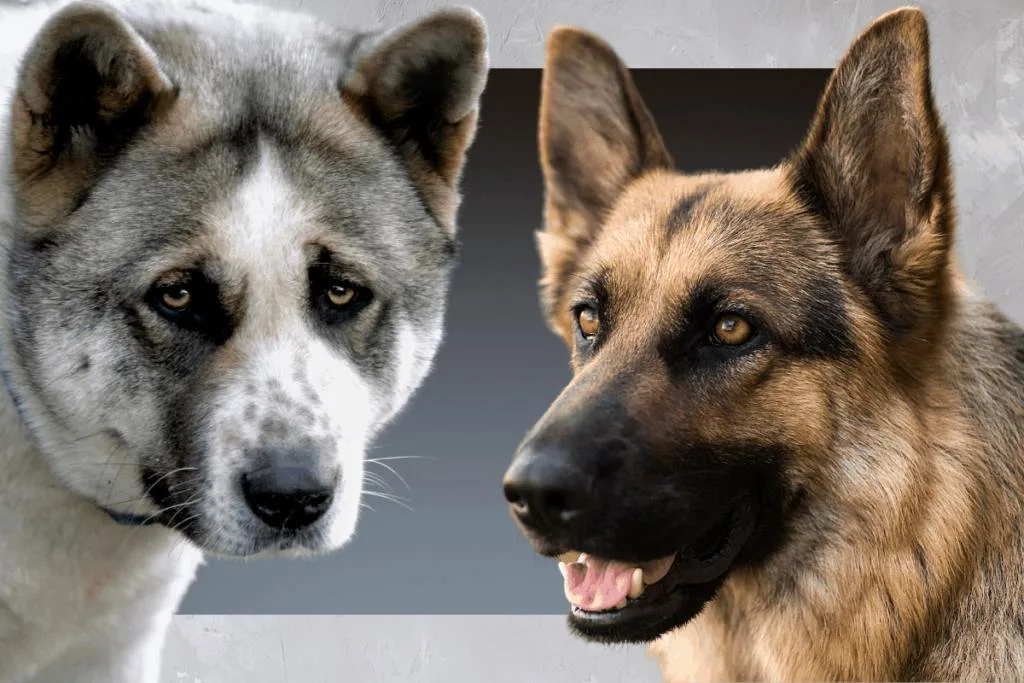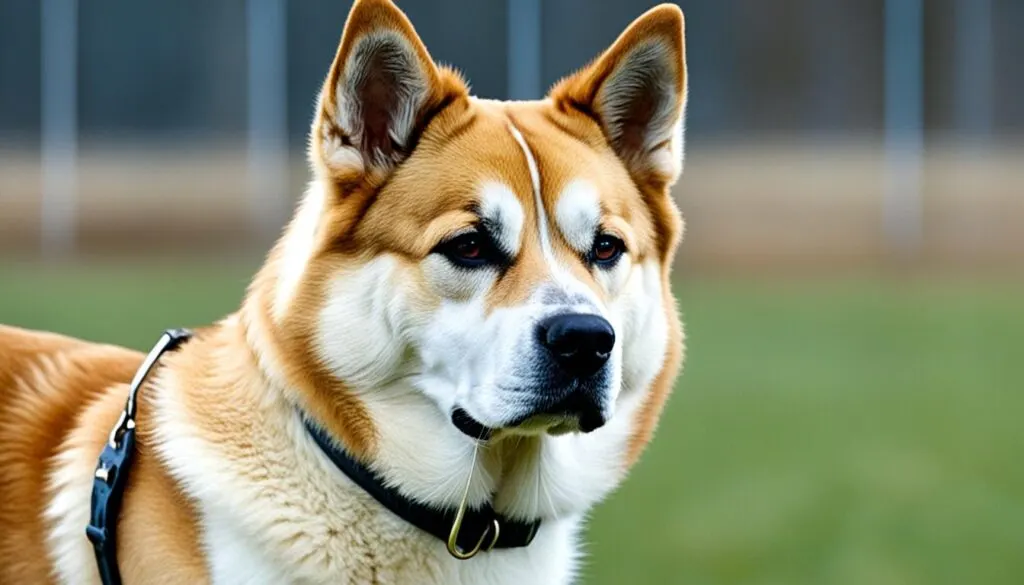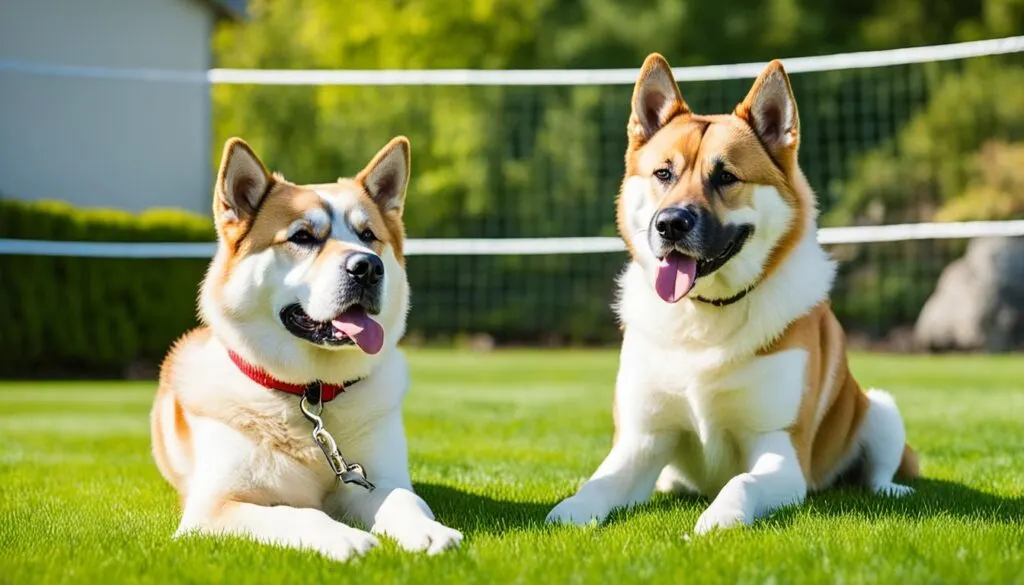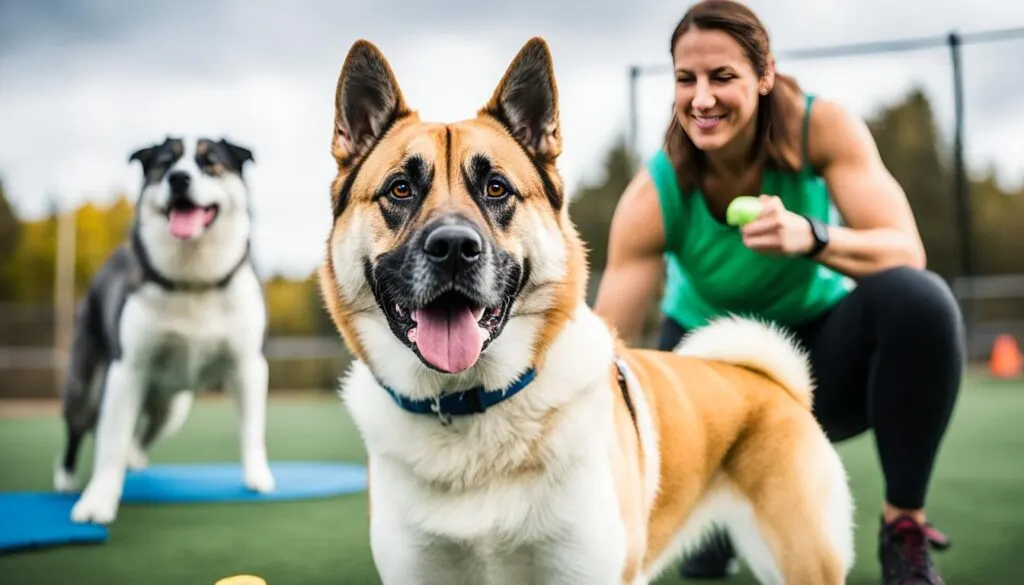Did you know that Akita mixed breeds are often unfairly labeled as dangerous?
Despite the misconceptions surrounding these dogs, it’s important to understand their temperament and behavior before passing judgment.
In this article, we will explore the truth behind Akita mixed breeds and shed light on their true nature.
Akita mixed breeds, like any other dog, can vary in personality and behavior based on various factors.
By gaining a deeper understanding of these dogs, we can challenge the stereotypes and promote a more accurate perception of Akita mixed breeds.

Click Here to Jump to a Section
Key Takeaways:
- Despite their reputation, Akita mixed breeds are not inherently dangerous.
- The temperament and behavior of Akita mixed breeds can be influenced by genetic and environmental factors.
- Proper training, socialization, and responsible ownership play a significant role in shaping the behavior of Akita mixed breeds.
- It is crucial to judge each dog individually rather than categorize an entire breed or mix based on stereotypes.
- Understanding and education are key in promoting a fair and accurate perception of Akita mixed breeds.
Understanding the Akita Mix Breed Temperament
When considering an Akita mix breed as a potential pet, it’s essential to understand the temperament of this unique crossbreed.
The temperament of an Akita mix breed can vary depending on several factors, including the individual dog’s genetics and upbringing.
Defining the Akita’s Personality Traits
The Akita breed is known for its loyalty, confidence, and protective nature.
Akitas are often described as dignified and independent, yet affectionate with their families.
These traits can be inherited by Akita mixes, influencing their overall temperament.
To understand the temperament of an Akita mix, it’s important to consider the temperament of the parent breeds as well.
For example, if an Akita is crossed with a more timid breed, the resulting mix might display a more reserved or cautious temperament.
How Mixed Breeds May Inherit Temperament
The temperament of mixed breed dogs, including Akita mixes, is influenced by a combination of genetics and environmental factors.
While genetics play a significant role in temperament inheritance, the dog’s environment and early socialization experiences can also shape their personality.
It’s worth noting that every Akita mix breed is unique, and temperament variations can occur even within the same litter.
Some Akita mixes may exhibit more dominant or assertive traits, while others may be more laid-back and easygoing.
Case Studies: Temperament Variations in Akita Mixes
Let’s explore a few case studies to highlight the temperament variations that can be observed in Akita mix breeds:
- Case Study 1: An Akita-Labrador mix may have a friendly and outgoing temperament, inheriting the Lab’s sociability and the Akita’s loyalty.
- Case Study 2: An Akita-German Shepherd mix might display a protective and confident temperament, inheriting the Shepherd’s guarding instincts and the Akita’s fearlessness.
- Case Study 3: An Akita-Poodle mix could exhibit an intelligent and adaptable temperament, combining the Poodle’s intelligence and the Akita’s versatility.
These case studies show that Akita mix breeds can possess a wide range of temperament traits, reflecting the unique blend of their parent breeds.
It’s important for prospective owners to consider these temperament variations and choose a mix that aligns with their lifestyle and preferences.
Common Behaviors Observed in Akita Mix Breeds
Understanding the behavior of Akita mix breeds is crucial for responsible pet ownership.
While individual dogs may vary, they often exhibit certain common behaviors that are important to be aware of.
This section will explore the protective or aggressive tendencies, interaction with other pets and strangers, as well as triggers and stress responses commonly observed in Akita mix breeds.
Protective or Aggressive Tendencies
Akita mix breeds are known for their protective nature, which can sometimes be misconstrued as aggression.
These dogs have a strong instinct to protect their family members and their territory.
While this protective behavior can be beneficial, it’s essential to properly train and socialize them to ensure they don’t become overly aggressive.
Implementing positive reinforcement training techniques and providing them with regular exercise and mental stimulation can help manage their protective tendencies effectively.
Interaction with Other Pets and Strangers
Akita mix breeds may have varying levels of socialization and tolerance toward other pets and strangers.
Some individuals may be wary of unfamiliar animals or people, while others may be more accepting.
Proper socialization from an early age plays a crucial role in shaping their behavior and promoting positive interactions.
Additionally, it’s important for owners to closely monitor their Akita mixes when introducing them to new pets or unfamiliar individuals to prevent any potential conflicts or aggression.
Triggers and Stress Responses in Akita Mixes

Akita mix breeds can have specific triggers that may cause stress or anxiety, leading to undesirable behavior.
These triggers can vary among individuals but may include loud noises, new environments, or unfamiliar experiences.
It’s important for owners to identify these triggers and provide a safe and predictable environment for their Akita mixes.
Gradual exposure to new situations and positive reinforcement can help them build confidence and reduce stress responses.
In the next section, we will address the question of whether Akita mixed breeds are dangerous, taking into account their behavior and temperament.
We will explore incidents related to aggression and examine the role of environment versus genetics in shaping their behavior.
Addressing the Question: Are Akita Mixed Breeds Dangerous?
When it comes to Akita mixed breeds, there is a common question that arises – are they dangerous?
It’s important to address this concern and provide a balanced perspective.
Akita mixed breeds, like any other dog breed, can exhibit a wide range of temperaments and behaviors.
While some individuals may display aggression or protective tendencies, it is crucial to understand that not all Akita mixes are dangerous.
Factors such as genetics, upbringing, socialization, and environment play a significant role in shaping a dog’s behavior.
It’s essential to evaluate each Akita mix on an individual basis rather than making generalized assumptions.
Investigating Akita Mix Breed Aggression Incidents
Despite the perception that Akita mixed breeds may be dangerous, it is essential to approach the topic with a fair and evidence-based perspective.
In this section, we will delve into the statistical data on Akita mix aggression incidents, explore the role of environment vs. genetics in aggression, and discuss preventative measures and responsible ownership.
Statistical Data on Akita Mix Incidents
To gain a better understanding of Akita mix aggression, let’s examine the statistical data available.
While it is important to note that incidents involving aggression can occur with any breed or mix, specific data for Akita mixes can shed light on the prevalence and severity of such incidents.
By analyzing this data, we can identify patterns and trends, helping us make informed judgments about Akita mix breed aggression.

Role of Environment vs. Genetics in Aggression
When it comes to aggression in Akita mixed breeds, it is crucial to consider the interplay between genetics and environment.
While genetics can influence certain predispositions, the environment a dog is raised in plays a significant role in shaping their behavior.
Factors such as socialization, training, and the owner’s handling can greatly impact a dog’s temperament.
Understanding the complex relationship between genetics and environment helps us develop effective strategies for managing and mitigating aggression.
Preventative Measures and Responsible Ownership
Preventing aggression incidents in Akita mixed breeds starts with responsible ownership.
It is essential for owners to provide a safe and nurturing environment that meets their dog’s physical and emotional needs.
This includes proper socialization, positive reinforcement training, and regular exercise.
Additionally, responsible owners should be proactive in seeking professional help if behavior issues arise.
By taking preventative measures and being diligent in their care, owners can minimize the risk of aggression incidents and ensure the overall well-being of their Akita mix breed.
Proper Safety Measures with Akita Mix Breed Dogs
Akita mix breed dogs, like any other dogs, require proper safety measures to ensure their well-being and the safety of those around them.
By creating a safe environment, implementing training best practices for aggression management, and knowing when to seek professional help for behavior issues, you can provide a secure and nurturing space for your Akita mix.
Creating a Safe Environment for Your Akita Mix
It is essential to create a safe environment for your Akita mix breed dog to prevent accidents and promote a sense of security. Here are some key measures to consider:
- Secure your property with high-quality fencing to prevent your dog from wandering off or encountering potential dangers.
- Remove any toxic plants, chemicals, or household items that could be hazardous to your dog’s health if ingested.
- Provide a designated space for your Akita mix to rest and relax, ensuring it is comfortable and free from any potential threats.
By implementing these safety measures, you can create a secure environment that minimizes the risk of accidents or harm to your Akita mix breed.
Training Best Practices for Aggression Management
Akita mix breed dogs may exhibit aggressive tendencies, which can be managed through proper training techniques. Here are some best practices to consider:
- Start obedience training from an early age to establish boundaries and reinforce positive behaviors.
- Use positive reinforcement techniques, such as treats and praise, to reward desirable behaviors and discourage aggressive ones.
- Consistency is key, so maintain a regular training schedule and reinforce commands consistently.
Training your Akita mix breed with patience and positive reinforcement can help manage aggression and promote a safe and well-behaved pet.
When to Seek Professional Help for Behavior Issues
If you’re facing persistent behavior issues with your Akita mix breed, it is crucial to seek professional help.
Professional dog trainers and behaviorists have the expertise to address complex behavior problems and provide appropriate solutions.
They can create a personalized training plan tailored to your Akita mix’s specific needs. Don’t hesitate to reach out to professionals to ensure the well-being and safety of both your dog and those around them.

Effective Training Strategies for Akita Mix Breeds
Training is a crucial aspect of raising Akita mix breeds.
By implementing effective training strategies, you can help shape their behavior, ensure their safety, and promote a harmonious relationship with your dog.
Here, we will discuss some key training techniques that are specific to the temperament and behavior of Akita mixes.

- Positive reinforcement: Using positive reinforcement techniques, such as rewards and treats, can motivate and encourage desired behaviors in your Akita mix breed. Rewarding them for good behavior reinforces the positive association and helps them understand what is expected of them.
- Consistency: It is important to establish consistent training routines for your Akita mix breed. Consistency in commands, rules, and expectations will help them understand boundaries and prevent confusion. Consistency also helps build trust and strengthen the bond between you and your dog.
- Patience: Akita mix breeds may take longer to learn certain commands or behaviors. It is crucial to be patient during the training process and avoid getting frustrated. Patience allows you to work at their pace and ensure a positive training experience for both you and your dog.
Remember that every Akita mix breed is unique, and training techniques may need to be adapted to their specific needs and temperament.
It is always recommended to seek guidance from a professional dog trainer who can provide personalized training advice and support.
Akita Mix Breed Care and Socialization Essentials
When it comes to caring for Akita mixed breeds, there are several essential factors to consider.
From exercise and grooming to nutrition and socialization, providing the right care is crucial for their well-being and development.
First and foremost, exercise is key for Akita mixes.
These dogs are known for their energy and athleticism, so providing regular physical activity is important.
Daily walks, playtime, and mentally stimulating activities will help keep them happy and healthy.
However, it’s important to note that their exercise needs may vary depending on their individual temperament and health.
Grooming is another aspect of care that should not be overlooked.
Akita mixes typically have a dense coat that requires regular brushing to prevent matting and keep their fur in good condition.
Additionally, regular nail trims, ear cleaning, and dental care should be included in their grooming routine.
Equally important is socialization, especially from a young age.
Akita mixes may inherit traits from both Akita and the other breed in their mix, so early socialization plays a crucial role in shaping their behavior and ensuring they become well-rounded and balanced dogs.
Introducing them to various people, animals, and environments in a positive and controlled manner will help prevent behavioral issues and promote positive social interactions.
